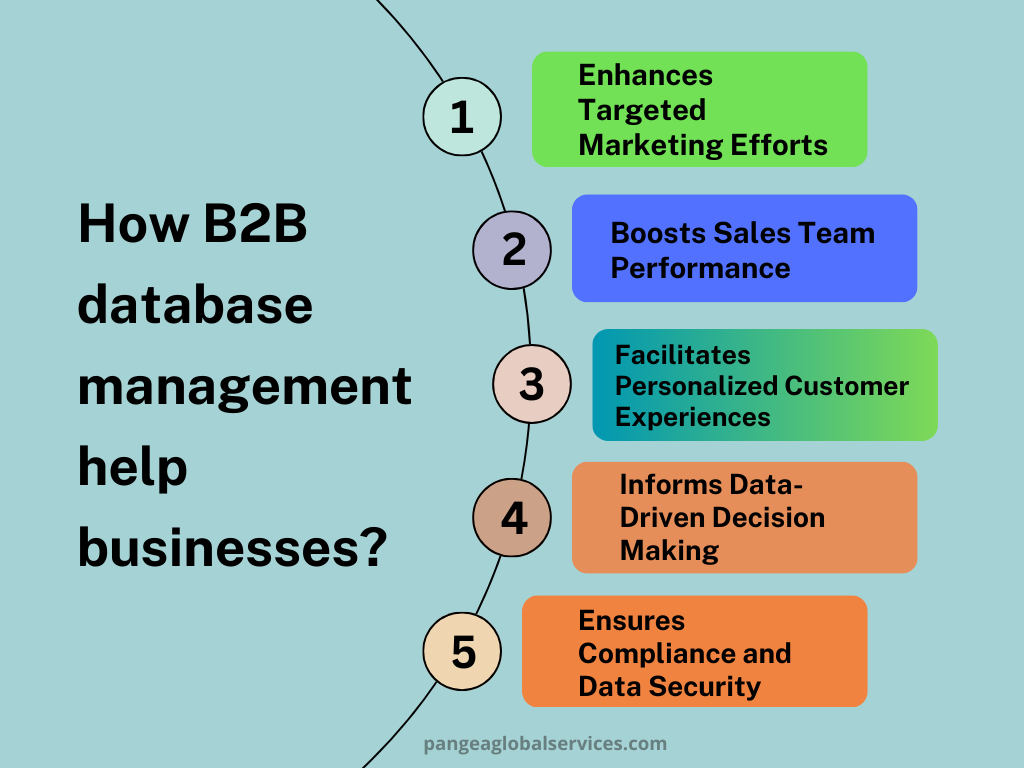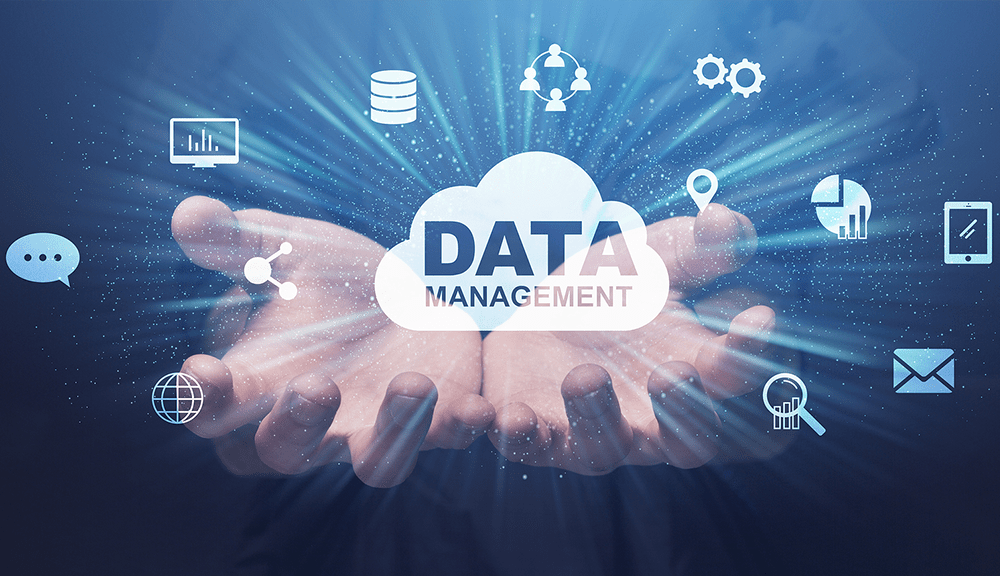B2B database management is important to business success. Companies that keep accurate and up-to-date databases can more effectively target their ideal clientele, boost marketing efforts, and expedite sales procedures.
Businesses can use structured data to make more educated decisions, improve customer connections, and ultimately drive development and profitability.
B2B database management investment in the US is expected to reach over 3.8 billion dollars by 2024. It was estimated that the value would rise to around four billion dollars the following year, an increase of nearly four percent.
Let’s learn more about B2B database –
What is B2B database?
A B2B database is a valuable collection of information about businesses that work with other businesses. This database includes details like company names, email addresses, phone numbers, and sometimes the roles of people within these companies. It’s like a big directory that companies use to find other businesses they can work with or sell their services and products to.
For example, if a company makes office furniture, they might use a B2B database to find other businesses that need new desks and chairs. They can see who to talk to (C-level employees) and how to contact them. This makes it easier to reach out and offer their furniture.
Having a B2B database helps companies save time because they don’t have to look everywhere for potential business partners. It also helps them to be more specific in their marketing efforts. Instead of sending messages to everyone, they can talk directly to businesses that might actually be interested in what they have to offer.
In simple terms, a B2B database is an essential tool for any business that sells to other businesses. It’s like having a map that shows you where to find companies that might need what you’re selling, making it easier to connect and do business together.
How to build a B2B database?
Building a B2B database is a strategic step for businesses looking to connect with other companies.
First, define your target market to understand who your ideal business clients are. This clarity helps focus your efforts on gathering relevant contacts.
Consider leveraging online platforms and social media to find business contacts. LinkedIn, for example, is a goldmine for B2B connections. By joining groups and participating in discussions, you can discover potential leads that fit your target criteria.
Attending industry events and trade shows is another effective way to collect business cards and contacts. These events are great for networking and meeting decision-makers in person. Make sure to follow up with new contacts via email or a phone call to add them to your database.
Using a customer relationship management (CRM) tool can help you organize and expand your B2B database efficiently. A CRM system allows you to track interactions and categorize contacts based on their interest level or stage in the buying process.
Consider purchasing a list from a reputable data provider if you need a head start. However, ensure the list is up-to-date and relevant to your business to avoid wasting resources on uninterested parties.
Building a B2B database requires patience and ongoing effort. A powerful resource that may greatly enhance your B2B marketing and sales activities can be created by regularly adding new contacts and updating information.

How B2B Database Management Help Business?
How B2B database management help businesses?
B2B database management plays an important role in driving business success, especially in today’s digital age. It offers a structured approach to storing and organizing business-to-business contact information, which is pivotal for various strategic operations. Here’s how it aids businesses:
Enhances Targeted Marketing Efforts
A well-maintained B2B database allows companies to segment their market accurately. By categorizing contacts based on industry, company size, or decision-making role, businesses can tailor their marketing campaigns. This customization increases the relevance of communication, improving engagement rates and conversion chances.
Boosts Sales Team Performance
Access to a comprehensive B2B database equips sales teams with essential insights about potential leads. Knowing a lead’s business background, current challenges, and needs enables sales representatives to approach them with relevant solutions. This targeted approach not only saves time but also significantly increases the likelihood of sales success.
Facilitates Personalized Customer Experiences
In the B2B sector, the importance of personalized interactions cannot be overstated. A detailed B2B database contains valuable information about clients’ preferences and purchase history. Using this data, businesses can customize their offerings and communication, leading to enhanced customer satisfaction and loyalty.
Informs Data-Driven Decision Making
The strategic use of a B2B database provides businesses with actionable insights into market trends, customer behavior, and the effectiveness of marketing campaigns. Analyzing this data helps in making informed decisions, refining marketing strategies, and optimizing resource allocation for better returns on investment.
Ensures Compliance and Data Security
Managing a B2B database with adherence to data protection laws is vital for maintaining customer trust and avoiding legal penalties. Regular updates and rigorous data management practices ensure that the database remains secure and compliant with regulations like GDPR, enhancing the company’s reputation for reliability and data security.
Effective B2B database management is indispensable for businesses looking to optimize their marketing, sales, and overall operational efficiency. It not only helps in targeting the right audience with precision but also plays a significant role in building strong customer relationships and driving sustainable growth.
Read more: AI & ML for Improved Data Management
What is a B2B lead database?
A B2B lead database is a crucial resource for any business looking to enhance its sales and marketing strategies effectively.
This specialized B2B database contains detailed information on potential clients and businesses, including contact details, company size, industry sector, and decision-makers’ names.
Such databases are essential for identifying and understanding target audiences in the B2B sector, enabling personalized and strategic outreach.
Businesses use these databases to streamline their lead generation processes, ensuring that marketing efforts are directed toward entities most likely to convert into customers.
Businesses can customize their offerings, services, and communications to each potential customer’s unique requirements and interests by having access to a multitude of information on possible leads.
This level of personalization significantly increases the chances of engaging leads and converting them into loyal customers.
A B2B database also facilitates effective market segmentation. By categorizing leads based on various criteria, such as industry, revenue, or geographical location, businesses can create more focused and effective marketing campaigns.
This targeted approach not only optimizes marketing resources but also enhances the overall success rate of lead conversion efforts.
A B2B lead database is an indispensable tool for businesses aiming to improve their lead generation and marketing precision.
It offers deep insights into potential clients, facilitating personalized, strategic outreach that drives better engagement, conversion rates, and ultimately, business growth.
How data is used in an effective B2B sales and marketing process?
In the B2B sales and marketing process, data guides strategies for reaching and engaging target audiences effectively.
Firstly, a B2B database provides detailed profiles of potential leads, enabling personalized marketing communications tailored to specific needs and interests.
Secondly, data analysis identifies trends and patterns, helping businesses anticipate market changes and adapt their strategies accordingly.
Lastly, through tracking engagement and responses, companies refine their sales pitches, focusing on what truly resonates with their audience.
Using a B2B database in these ways enhances the efficiency and effectiveness of sales and marketing efforts, driving better results.
Conclusion
A B2B database is a powerful tool that drives business success by enhancing sales and marketing strategies. Building and managing a B2B database allows businesses to understand and connect with their target audience more effectively.
It not only streamlines the process of identifying potential leads but also supports personalized and impactful marketing efforts.
Businesses that use data effectively can make more informed decisions, customize their tactics to fit client demands, and ultimately achieve greater outcomes in their sales and marketing initiatives.
So, investing in a B2B database is critical for every organization that wants to succeed in today’s competitive industry.
If you are looking for a data management partner, we are here to help. To learn more about our data management services, contact us now.
FAQs
-
What is B2B Database Management?
B2B Database Management (DBM) is the process of collecting, organizing, maintaining, and analyzing your data about other businesses (clients, partners, competitors). It’s like having a central filing cabinet for all your B2B interactions, keeping everything organized and easily accessible.
-
Why is B2B Data Management important?
Imagine struggling to find accurate contact information for a potential client or wasting time managing outdated data. Effective B2B DBM prevents these headaches by:
- Boosting Efficiency: Quickly access the right data, automate tasks, and streamline processes.
- Improving Lead Generation: Target ideal customers with accurate information and personalized campaigns.
- Enhancing Relationships: Build stronger connections with partners and clients based on insights about their needs.
- Gaining Competitive Advantage: Make data-driven decisions, identify trends, and adapt to market changes faster.
-
What are the Key Features of B2B Database Management Software?
Different software offers various features, but some core functionalities include:
- Data Import and Consolidation: Gather data from multiple sources into a single platform.
- Data Cleaning and Deduplication: Eliminate errors, inconsistencies, and duplicate entries.
- Segmentation and Targeting: Group contacts based on specific criteria for targeted communication.
- Reporting and Analytics: Gain insights into customer behavior, trends, and campaign performance.
- Security and Compliance: Protect sensitive data with robust security measures.
-
How Does B2B Database Management Help Different Business Departments?
- Marketing: identify ideal prospects, personalize campaigns, and measure campaign effectiveness.
- Sales: Focus on the right leads, shorten sales cycles, track win rates, and improve close rates.
- Customer Service: Deliver personalized support, anticipate customer needs, and foster stronger relationships.
- Management: Make data-driven decisions, understand market trends, and track overall business performance.
-
How can I get started with B2B Database Management?
- Assess your needs: Identify your data management challenges and desired outcomes.
- Research software options: Explore different tools based on your budget and functionalities needed.
- Clean and consolidate your data: Ensure your data is accurate and complete before migrating to a new system.
- Implement and train your team: Choose a user-friendly solution and train your team on best practices.
- Continuously monitor and optimize: Regularly evaluate your data and refine your processes for improved results.
Bonus Tip: Start small and prioritize the data most critical to your business. Expand your DBM system as your needs evolve.
By implementing effective B2B Database Management, your business can get valuable insights, optimize operations, and achieve sustainable growth.






